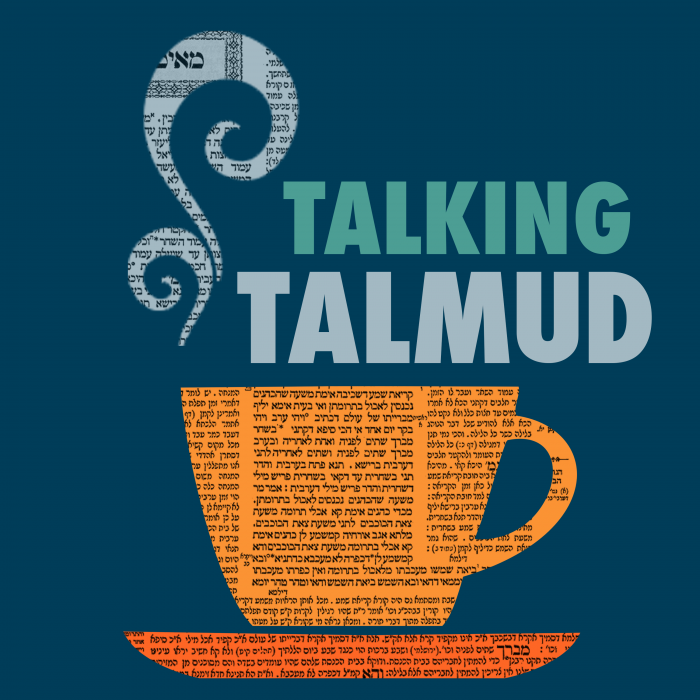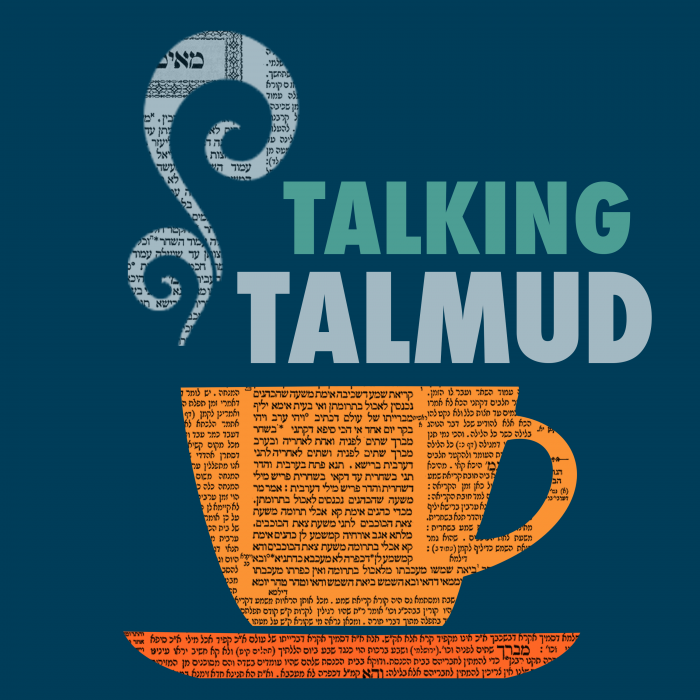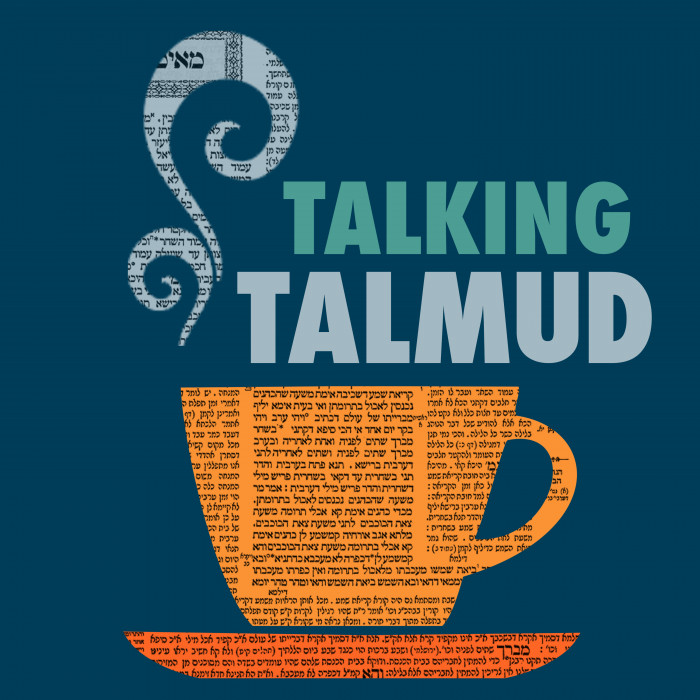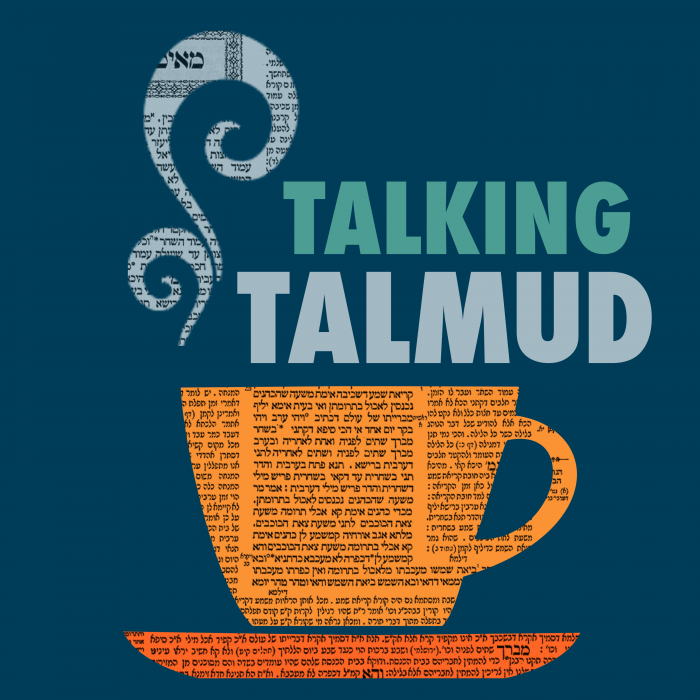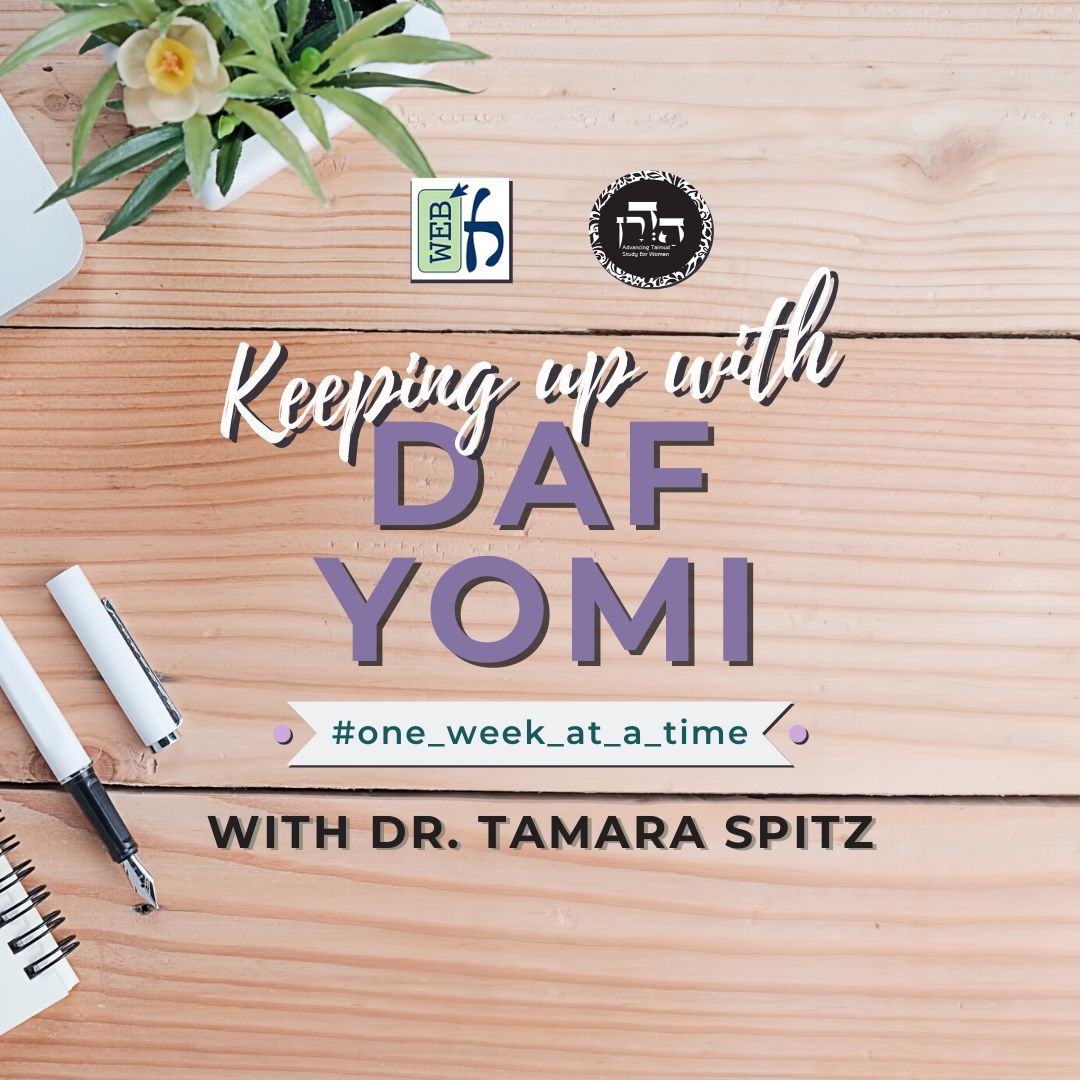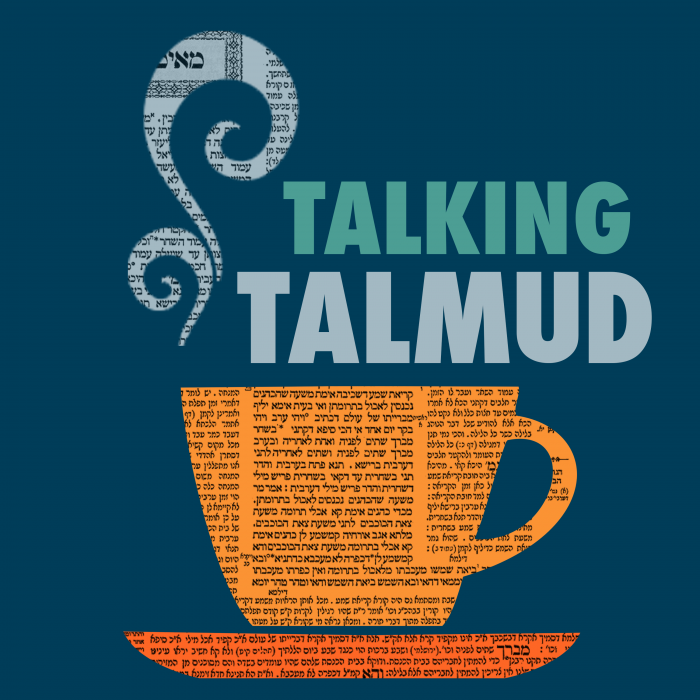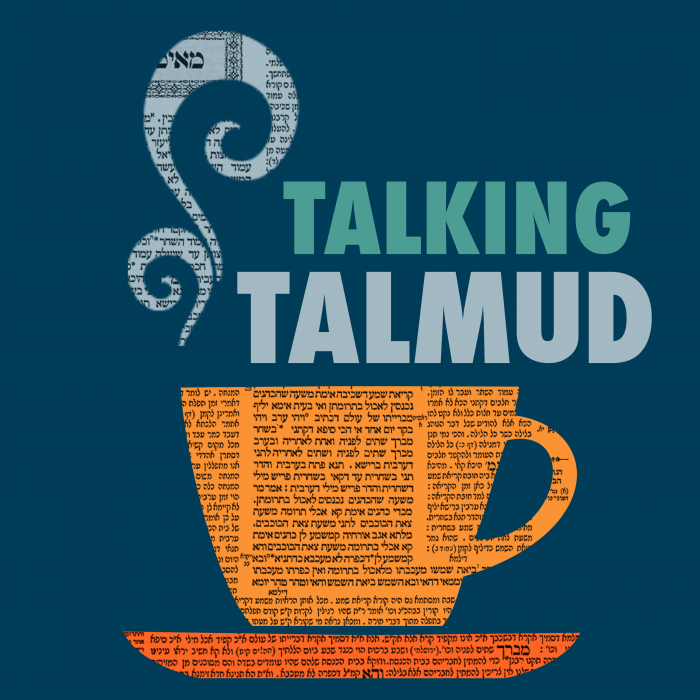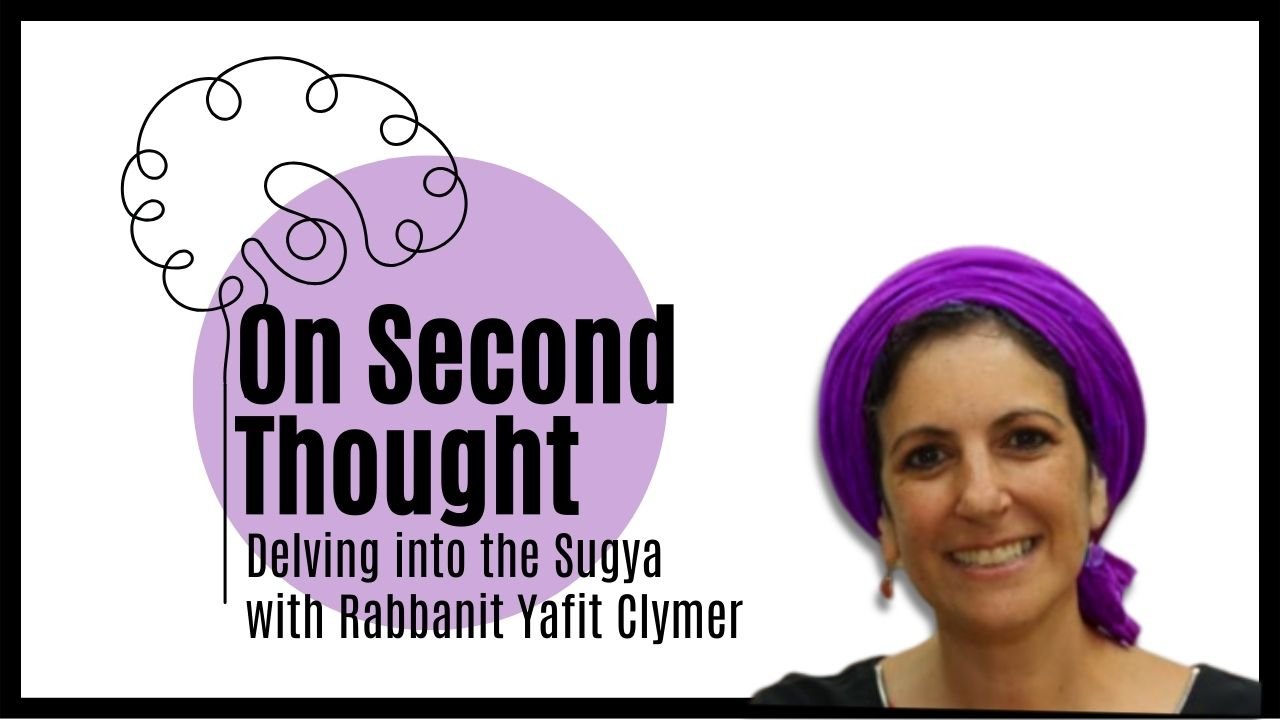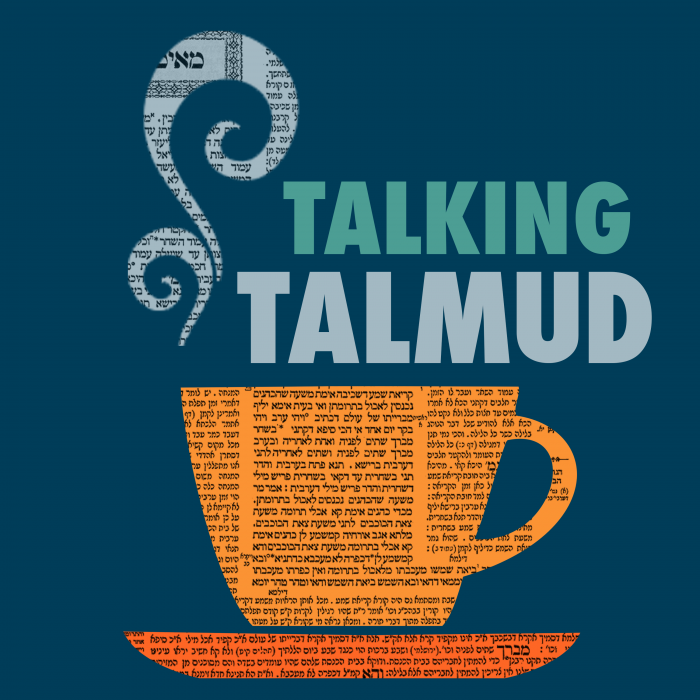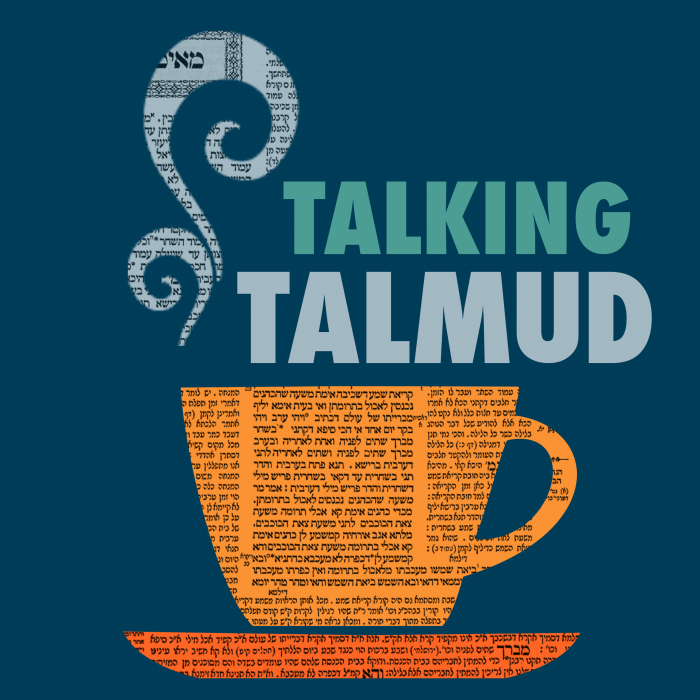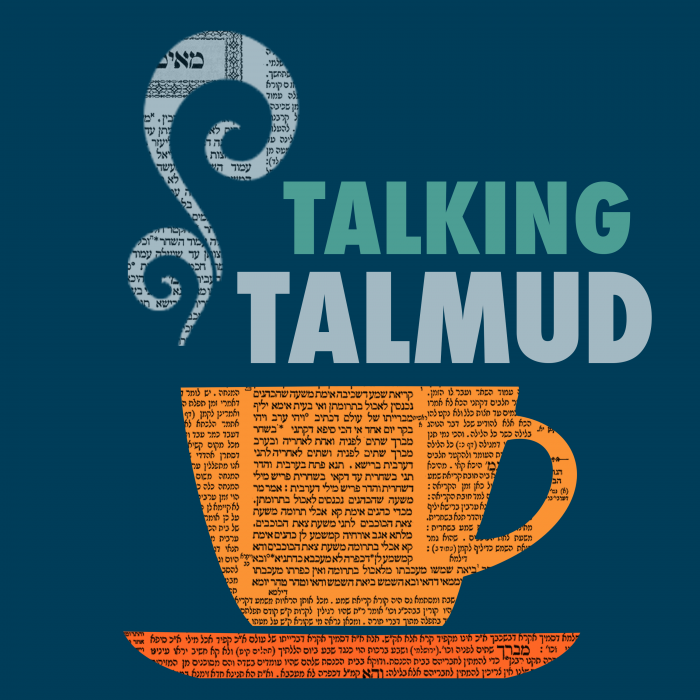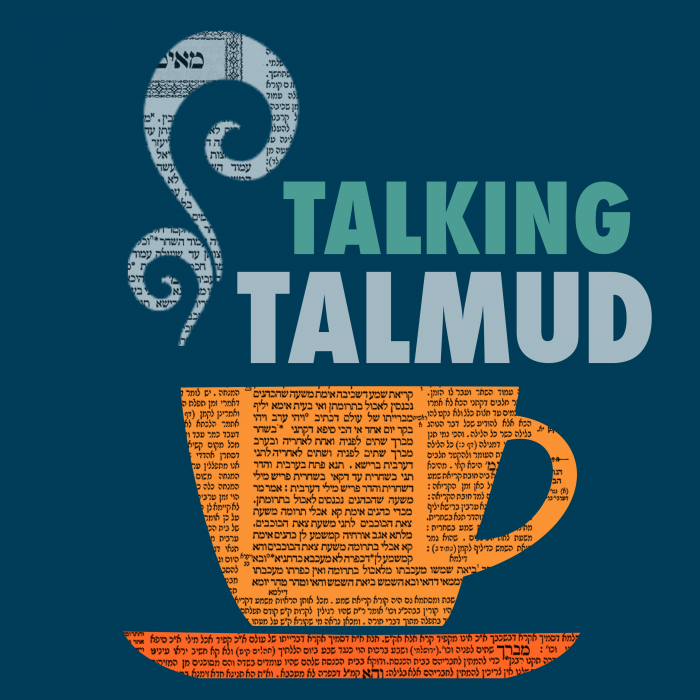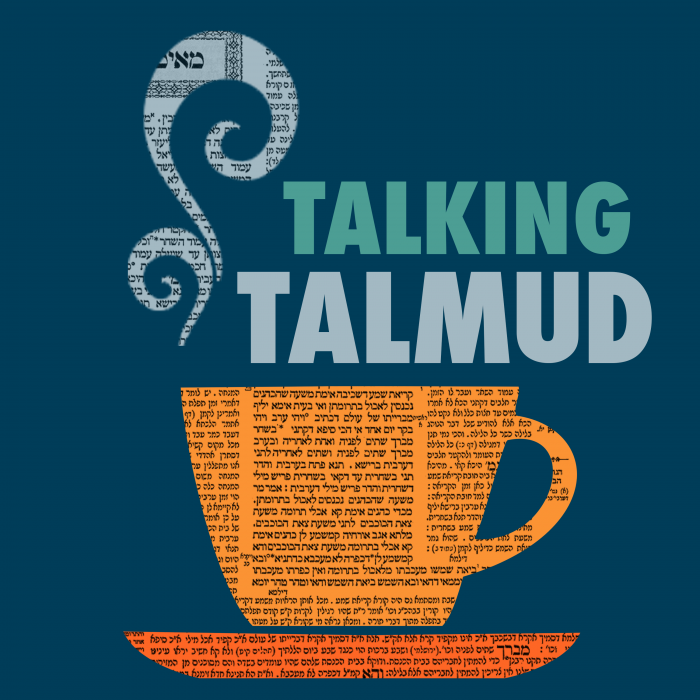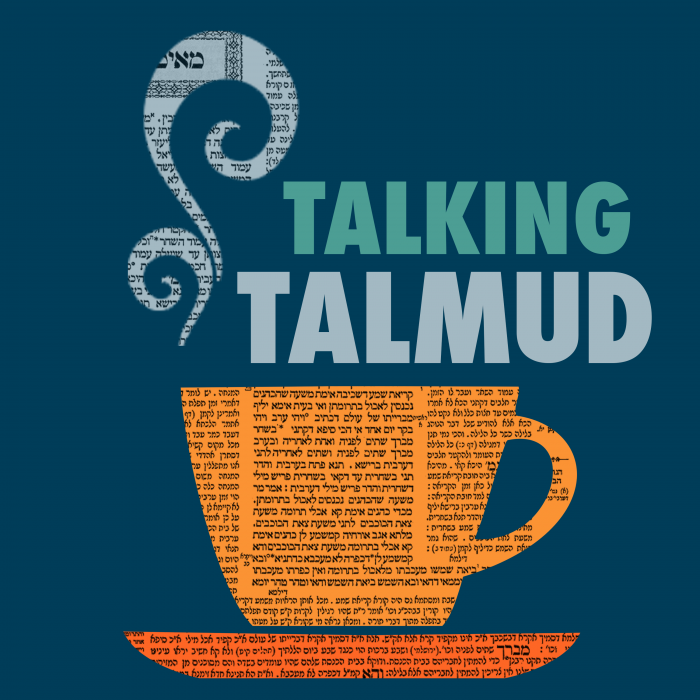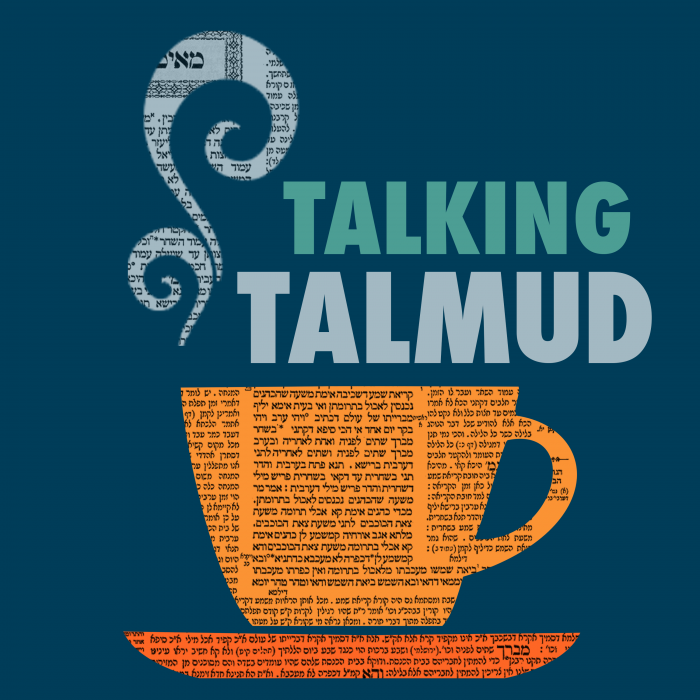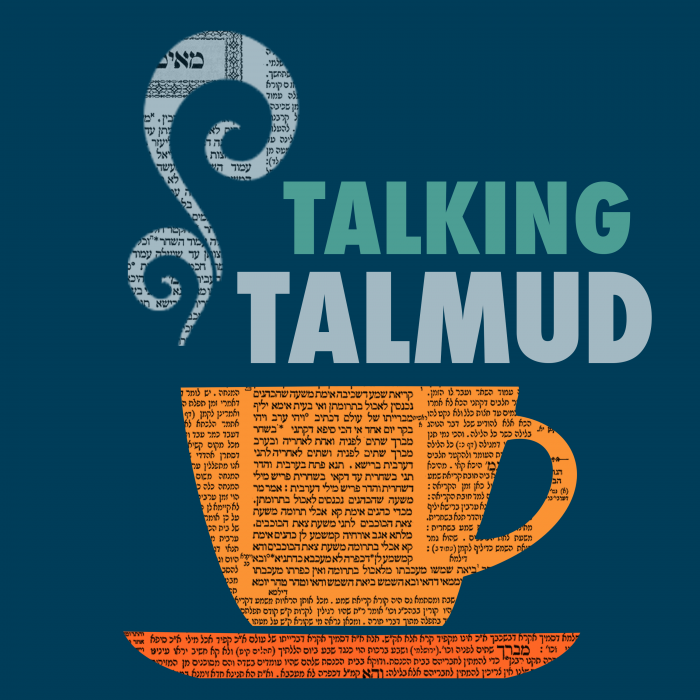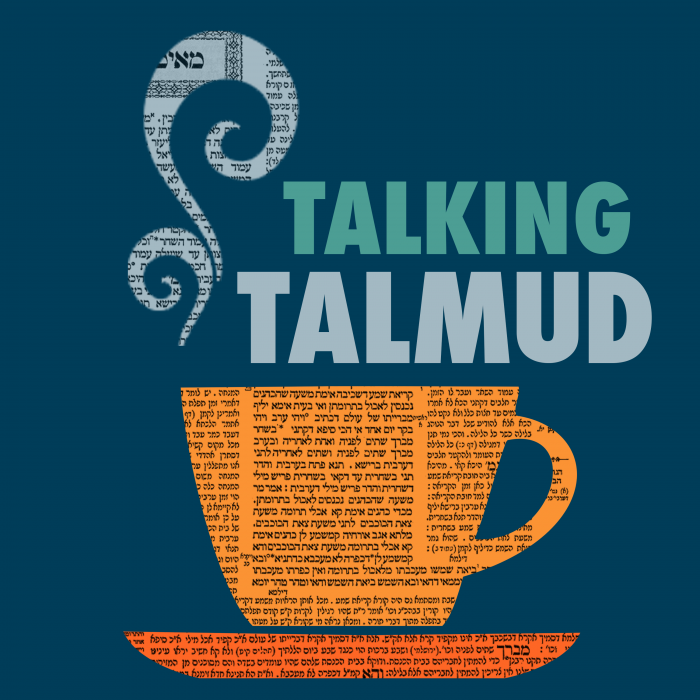What does a rapist or seducer pay for humiliation and suffering in addition to the fifty shekalim payment? One who falsely claims his wife was not a virgin is punished for his words. Since he pays double the rapist and seducer we learn that words are more harmful than actions. The gemara launches into statements regarding the severity of lashon hara.
This week’s learning is sponsored for the merit and safety of Haymanut (Emuna) Kasau, who was 9 years old when she disappeared from her home in Tzfat two years ago, on the 16th of Adar, 5784 (February 25, 2024), and whose whereabouts remain unknown.
This week’s learning is dedicated of the safety of our nation, the soldiers and citizens of Israel, and for the liberation of the Iranian people. May we soon see the realization of “ליהודים היתה אורה ושמחה וששון ויקר”.
Want to dedicate learning? Get started here:


Today’s daily daf tools:
This week’s learning is sponsored for the merit and safety of Haymanut (Emuna) Kasau, who was 9 years old when she disappeared from her home in Tzfat two years ago, on the 16th of Adar, 5784 (February 25, 2024), and whose whereabouts remain unknown.
This week’s learning is dedicated of the safety of our nation, the soldiers and citizens of Israel, and for the liberation of the Iranian people. May we soon see the realization of “ליהודים היתה אורה ושמחה וששון ויקר”.
Today’s daily daf tools:
Delve Deeper
Broaden your understanding of the topics on this daf with classes and podcasts from top women Talmud scholars.
New to Talmud?
Check out our resources designed to help you navigate a page of Talmud – and study at the pace, level and style that fits you.
The Hadran Women’s Tapestry
Meet the diverse women learning Gemara at Hadran and hear their stories.
Arakhin 15
אִילּוּ בָּאוּ עָלֶיהָ שְׁנַיִם, אֶחָד שֶׁלֹּא כְּדַרְכָּהּ וְאֶחָד כְּדַרְכָּהּ, יֹאמְרוּ: בָּעַל פְּגוּמָה — חֲמִשִּׁים, בָּעַל שְׁלֵמָה — חֲמִשִּׁים?
Had two men engaged in forced intercourse with her, one in an atypical manner, i.e., anal intercourse, leaving her hymen untouched, and one in a typical manner, vaginal intercourse, in which case the second man pays the fine, people will say: Does it make sense that one who engaged in forced intercourse with a tainted woman, who has had anal intercourse, pays fifty sela, and one who engaged in forced intercourse with an untainted virgin also pays fifty sela? Apparently, the fifty sela is the fixed sum of the fine, while the rest of the payment varies on a case-by-case basis.
אֲמַר לֵיהּ אַבָּיֵי: אִי הָכִי, גַּבֵּי עֶבֶד נָמֵי יֹאמְרוּ: עֶבֶד בָּרִיא — שְׁלֹשִׁים, עֶבֶד מוּכֵּה שְׁחִין — שְׁלֹשִׁים!
Abaye again said to Rav Zeira: If so, the same claim can be applied with regard to a slave who is killed by an ox. People will say: Does it make sense that a healthy slave is worth thirty sela and a slave afflicted with boils is also worth thirty sela? Yet the mishna clearly indicates that there is no distinction, as the Torah states a fixed amount.
אֶלָּא אָמַר אַבָּיֵי, אָמַר קְרָא ״תַּחַת אֲשֶׁר עִנָּהּ״, מִכְּלָל דְּאִיכָּא בּוֹשֶׁת וּפְגָם.
Rather, Abaye said that the reason the payment of fifty sela does not cover all forms of damage is that the verse states: “Then the man that lay with her shall give to the young woman’s father fifty silver shekels, and she shall be his wife, because he tormented her; he may not send her away all his days” (Deuteronomy 22:29). This means that the payment is only for the torment, i.e., the rape. It may be inferred that there are additional payments for humiliation and degradation, beyond payment of the fine.
רָבָא אָמַר, דְּאָמַר קְרָא: ״וְנָתַן הָאִישׁ הַשֹּׁכֵב עִמָּהּ וְגוֹ׳״, הֲנָאַת שְׁכִיבָה חֲמִשִּׁים, מִכְּלָל דְּאִיכָּא מִילְּתָא אַחֲרִיתִי, וּמַאי נִיהוּ? בּוֹשֶׁת וּפְגָם.
Rava says a different answer, that the verse states: “Then the man that lay with her shall give to the young woman’s father fifty silver shekels” (Deuteronomy 22:29). Rava infers from here that payment for the pleasure of lying with the woman is fifty shekel. It may be inferred from here that there are other matters that must be paid by the rapist. And what are they? Compensation for humiliation and degradation.
מַתְנִי׳ בְּמוֹצִיא שֵׁם רַע לְהָקֵל וּלְהַחֲמִיר, כֵּיצַד? אֶחָד שֶׁהוֹצִיא שֵׁם רַע עַל גְּדוֹלָה שֶׁבַּכְּהוּנָּה וְעַל קְטַנָּה שֶׁבְּיִשְׂרָאֵל — נוֹתֵן מֵאָה סֶלַע.
MISHNA: There are halakhot with regard to a defamer, who falsely claims that his bride was not a virgin, that are lenient and others that are stringent. How so? Both one who defamed a young woman who is the most prominent in the priesthood and one who defamed a young woman who is the lowliest among the Israelites gives payment of one hundred sela, the fine stated in the Torah (Deuteronomy 22:19).
נִמְצָא הָאוֹמֵר בְּפִיו חָמוּר מִן הָעוֹשֶׂה מַעֲשֶׂה, שֶׁכֵּן מָצִינוּ שֶׁלֹּא נִתְחַתֵּם גְּזַר דִּין עַל אֲבוֹתֵינוּ בַּמִּדְבָּר אֶלָּא עַל לָשׁוֹן הָרָע, שֶׁנֶּאֱמַר ״וַיְנַסּוּ אוֹתִי זֶה עֶשֶׂר פְּעָמִים וְגוֹ׳״.
Based on the relative scope of the fines, with the defamer paying twice the sum of the rapist and the seducer, it is apparent that one who utters malicious speech with his mouth is a more severe transgressor than one who performs an action. And this is corroborated, as we found that the sentence imposed on our ancestors in the wilderness was sealed only due to the malicious speech disseminated by the spies, as it is stated at that time: “All those men that have seen My glory, and My signs, which I wrought in Egypt and in the wilderness, yet they have tried Me these ten times and have not listened to My voice” (Numbers 14:22).
גְּמָ׳ מִמַּאי? דִּלְמָא מִשּׁוּם דְּקָא גָרֵים לַהּ קְטָלָא, דִּכְתִיב: ״וְאִם אֱמֶת הָיָה הַדָּבָר וְגוֹ׳ וְהוֹצִיאוּ אֶת הַנַּעֲרָה וְגוֹ׳״!
GEMARA: The mishna teaches that one who utters malicious speech with his mouth is a more severe sinner than one who performs an action. The Gemara asks: From where is this proven? Perhaps the punishment for the one who defames is more severe because the defamation has the potential to cause his wife’s death. As it is written: “But if this thing be true, that the signs of virginity were not found in the young woman, then they shall bring out the young woman to the door of her father’s house, and the men of her city shall stone her with stones that she die” (Deuteronomy 22:20–21).
אָמַר רָבָא, אָמַר קְרָא: ״כִּי הוֹצִיא שֵׁם רָע״, עַל שֵׁם רַע שֶׁהוֹצִיא.
Rava said that the verse states: “And they shall fine him a hundred shekels of silver, and give them unto the father of the young woman, because he has defamed a virgin of Israel; and she shall be his wife; he may not send her away all his days” (Deuteronomy 22:19). This indicates that he is punished severely for his words, for the defamation, not because she might be put to death.
וְכֵן מָצִינוּ שֶׁלֹּא נִתְחַתֵּם גְּזַר דִּין וְכוּ׳. מִמַּאי דִּלְמָא דְּאַכַּתִּי לָא מְלָא סְאָתָן, דְּאָמַר רַב הַמְנוּנָא: אֵין הַקָּדוֹשׁ בָּרוּךְ הוּא נִפְרָע מִן הָאָדָם עַד שֶׁתִּתְמַלֵּא סְאָתוֹ, שֶׁנֶּאֱמַר: ״בִּמְלֹאת סִפְקוֹ יֵצֶר לוֹ״.
§ The mishna teaches: As we found that the sentence imposed on our ancestors in the wilderness was sealed only due to the malicious speech disseminated by the spies. The Gemara asks: From where is known that their punishment was due to the malicious speech of the spies? Perhaps until that time their se’a, the measure of their sins warranting punishment, was not yet filled, as Rav Hamnuna says: The Holy One, Blessed be He, does not punish a person until his se’a is filled, as it is stated: “In the fullness of his sufficiency he shall be in straits” (Job 20:22). In other words, one is punished only when he has committed a sufficient number of sins, and the malicious speech of the spies was simply the last of a series of transgressions.
אָמַר רֵישׁ לָקִישׁ, אָמַר קְרָא: ״וַיְנַסּוּ אוֹתִי זֶה עֶשֶׂר פְּעָמִים״, עַל זֶה נִתְחַתֵּם גְּזַר דִּין.
Reish Lakish said that the verse states: “All those men who have seen My glory, and My signs, which I wrought in Egypt and in the wilderness, yet they have tried Me now [zeh] ten times and have not listened to My voice” (Numbers 14:22). The extra word “now [zeh]” teaches that their sentence was sealed for this specific sin, i.e., the malicious speech of the spies.
תַּנְיָא, אָמַר רַבִּי אֶלְעָזָר בֶּן פַּרְטָא: בּוֹא וּרְאֵה כַּמָּה גָּדוֹל כֹּחַ שֶׁל לָשׁוֹן הָרָע, מְנָלַן? מִמְּרַגְּלִים; וּמָה הַמּוֹצִיא שֵׁם רַע עַל עֵצִים וַאֲבָנִים כָּךְ, הַמּוֹצִיא שֵׁם רַע עַל חֲבֵירוֹ עַל אַחַת כַּמָּה וְכַמָּה!
It is taught in a baraita that Rabbi Elazar ben Perata says: Come and see how great the power of malicious speech is. From where do we derive this? From the punishment received by the spies. And if one who defames the wood and rocks of Eretz Yisrael received such a severe punishment, then with regard to one who defames another person, all the more so will he be punished severely.
מִמַּאי? דִּלְמָא מִשּׁוּם דְּרַבִּי חֲנִינָא בַּר פָּפָּא, דְּאָמַר רַבִּי חֲנִינָא בַּר פָּפָּא: דָּבָר גָּדוֹל דִּבְּרוּ מְרַגְּלִים בְּאוֹתָהּ שָׁעָה, דִּכְתִיב: ״כִּי חָזָק הוּא מִמֶּנוּ״, אַל תִּיקְרֵי ״כִּי חָזָק הוּא מִמֶּנוּ״ אֶלָּא ״מִמֶּנּוּ״, כִּבְיָכוֹל, בַּעַל הַבַּיִת אֵין יָכוֹל לְהוֹצִיא כֵּלָיו מִשָּׁם.
The Gemara asks: From where is it known that the punishment of the spies was for malicious speech? Perhaps their punishment was due to the sin explained by Rabbi Ḥanina bar Pappa. As Rabbi Ḥanina bar Pappa says: The spies uttered a great statement of blasphemy at that time. As it is written: “But the men that went up with him said: We are not able to go up against the people; for they are stronger than us [mimmennu]” (Numbers 13:31). Do not read this as “for they are stronger than us [mimmennu]” but rather read it as: For they are stronger than Him [mimmennu]. i.e., stronger than God. They were saying, as it were, that the owner, i.e., God, cannot remove His utensils, the inhabitants of Eretz Yisrael, from there. If so, one can explain that the spies were punished for their blasphemy rather than for their malicious speech.
אֶלָּא אָמַר רַבָּה אָמַר רֵישׁ לָקִישׁ, אָמַר קְרָא: ״וַיָּמוּתוּ הָאֲנָשִׁים מוֹצִאֵי דִבַּת הָאָרֶץ רָעָה״, עַל דִּבַּת הָאָרֶץ שֶׁהוֹצִיאוּ.
Rather, Rabba says that Reish Lakish says that the verse states: “Those men that brought up an evil report of the land died by the plague before the Lord” (Numbers 14:37). This teaches that they were punished not for their blasphemy but for the evil report of the land that they brought.
תַּנְיָא: אָמַר רַבִּי יְהוּדָה, עֶשֶׂר נִסְיוֹנוֹת נִיסּוּ אֲבוֹתֵינוּ לְהַקָּדוֹשׁ בָּרוּךְ הוּא: שְׁנַיִם בַּיָּם, וּשְׁנַיִם בַּמַּיִם, שְׁנַיִם בַּמָּן, שְׁנַיִם בַּשְּׂלָיו, אַחַת בָּעֵגֶל, וְאַחַת בְּמִדְבַּר פָּארָן.
It is taught in a baraita that Rabbi Yehuda says: Our ancestors tried the Holy One, Blessed be He with ten trials: Two at the sea, and two with water, two with the manna, two with the quail, one with the golden calf, and one in the wilderness of Paran.
שְׁנַיִם בַּיָּם: אַחַת בַּיְּרִידָה וְאַחַת בָּעֲלִיָּיה. בַּיְּרִידָה — דִּכְתִיב ״הַמִבְּלִי אֵין קְבָרִים בְּמִצְרַיִם״.
The Gemara lists the ten trials in detail. Two at the sea: One when the Jews descended into the sea, and one when they ascended from the sea. The Jews tried God when they descended into the sea, as it is written: “And they said to Moses: Because there were no graves in Egypt, have you taken us away to die in the wilderness? What is this you have done to us, to take us out of Egypt” (Exodus 14:11).
בָּעֲלִיָּיה — כִּדְרַב הוּנָא, דְּאָמַר רַב הוּנָא: יִשְׂרָאֵל שֶׁבְּאוֹתוֹ הַדּוֹר מִקְּטַנֵּי אֲמָנָה הָיוּ, כִּדְרַבָּה בַּר מָרִי, דְּאָמַר רַבָּה בַּר מָרִי: מַאי דִּכְתִיב ״וַיַּמְרוּ עַל יָם בְּיַם סוּף וַיּוֹשִׁיעֵם לְמַעַן שְׁמוֹ״? מְלַמֵּד שֶׁהָיוּ יִשְׂרָאֵל מַמְרִים בְּאוֹתָהּ שָׁעָה, וְאוֹמְרִים: כְּשֵׁם שֶׁאָנוּ עוֹלִים מִצַּד זֶה כָּךְ מִצְרַיִם עוֹלִים מִצַּד אַחֵר.
And they also tried God when they ascended from the sea, in accordance with the opinion of Rav Huna, as Rav Huna says: The Jewish people of that generation, during the Exodus, were of little faith. This is in accordance with a statement of Rabba bar Mari. As Rabba bar Mari says: What is the meaning of that which is written: “But they were rebellious at the sea, even at the Red Sea. Nevertheless, He saved them for His Name’s sake” (Psalms 106:7–8)? This teaches that the Jews were rebellious at that time, and they said: Just as we are ascending from one side, so too perhaps the Egyptians are ascending from the other side, and we will not be saved.
אָמַר לוֹ הַקָּדוֹשׁ בָּרוּךְ הוּא לְשַׂר שֶׁל יָם: פְּלוֹט אוֹתָם לַיַּבָּשָׁה! אָמַר לְפָנָיו: רִבּוֹנוֹ שֶׁל עוֹלָם, כְּלוּם יֵשׁ עֶבֶד שֶׁנּוֹתֵן לוֹ רַבּוֹ מַתָּנָה וְחוֹזֵר וְנוֹטְלָהּ הֵימֶנּוּ? אָמַר לוֹ: אֲנִי נוֹתֵן לְךָ אֶחָד וּמֶחֱצָה שֶׁבָּהֶם.
The Holy One, Blessed be He, said to the ministering angel of the sea: Spew out the dead Egyptians onto dry land. The ministering angel said before Him: Master of the Universe, is there a servant whose master gives him a gift and then takes it from him? Since the dead Egyptians were given to me for my fish to eat, how can You retract Your gift? God said to the sea: I will give you one and a half times their number. Although I am taking them back now, later I will give you one and a half times as many people. In the case of the Egyptians it is stated: “Six hundred chosen chariots” (Exodus 14:7), whereas with regard to Sisera, who was defeated at the Kishon Brook, it is written: “Nine hundred chariots of iron” (Judges 4:13).
אָמַר לְפָנָיו: רִבּוֹנוֹ שֶׁל עוֹלָם, כְּלוּם יֵשׁ עֶבֶד שֶׁתּוֹבֵעַ אֶת רַבּוֹ? אָמַר לוֹ: נַחַל קִישׁוֹן יִהְיֶה עָרֵב, מִיָּד פְּלָטָן לַיַּבָּשָׁה, דִּכְתִיב: ״וַיַּרְא יִשְׂרָאֵל אֶת מִצְרַיִם מֵת עַל וְגוֹ׳״
The ministering angel said before Him: Master of the Universe, is there a servant who issues a claim against his master for a gift promised to him? Who will be the guarantor? God said to the ministering angel: The Kishon Brook will be a guarantor for Me. Immediately, the sea spewed the Egyptians out onto the land, and the Jewish people came and saw that they were dead. As it is written: “And Israel saw the Egyptians dead upon the seashore” (Exodus 14:30).
שְׁנַיִם בַּמַּיִם — בְּמָרָה וּבִרְפִידִים. בְּמָרָה, דִּכְתִיב: ״וַיָּבוֹאוּ מָרָתָה וְלֹא יָכְלוּ לִשְׁתּוֹת״, וּכְתִיב: ״וַיָּלֶן הָעָם עַל מֹשֶׁה״.
The Gemara continues its list of the Jewish people’s trials of God: Two with water: One in Mara and one in Rephidim. The Jewish people tested God in Mara as it is written: “And when they came to Mara, they could not drink of the waters of Mara, for they were bitter. Therefore the name of it was called Mara” (Exodus 15:23), as Mara means bitter. And it is written: “And the people murmured against Moses, saying: What shall we drink?” (Exodus 15:24).
בִּרְפִידִים — דִּכְתִיב: ״וַיַּחֲנוּ בִּרְפִידִים וְאֵין מַיִם לִשְׁתּוֹת״, וּכְתִיב: ״וַיָּרֶב הָעָם עִם מֹשֶׁה״.
The Jewish people also tested God in Rephidim, as it is written: “And all the congregation of the children of Israel journeyed from the wilderness of Sin, by their stages, according to the commandment of the Lord, and encamped in Rephidim; and there was no water for the people to drink” (Exodus 17:1). And it is written: “And the people fought with Moses, and said: Give us water that we may drink. And Moses said to them: Why do you fight with me? Why do you test the Lord?” (Exodus 17:2).
שְׁנַיִם בַּמָּן — דִּכְתִיב:
The Gemara continues: Two with manna, as it is written:
״אַל תֵּצֵאוּ״ וַיֵּצְאוּ, ״אַל תּוֹתִירוּ״ וַיּוֹתִירוּ.
Do not go out, as indicated in the verse: “And Moses said: Eat that today; for today is a Sabbath for the Lord; today you will not find it in the field” (Exodus 16:25). But nevertheless there were people who went out to look for manna, as it is written: “And it came to pass on the seventh day that some of the people went out to gather, and they found none” (Exodus 16:27). The verse also states: “And Moses said to them: Let no man leave any of it until the morning” (Exodus 16:19), and there were people who left it until morning, as it states: “But they did not listen to Moses; and some of them left of it until the morning, and it bred worms, and rotted; and Moses was angry with them” (Exodus 16:20).
שְׁנַיִם בַּשְּׂלָיו [בִּשְׂלָיו] — רִאשׁוֹן וּבִשְׂלָיו שֵׁנִי. בִּשְׂלָיו רִאשׁוֹן — ״בְּשִׁבְתְּכֶם עַל סִיר הַבָּשָׂר״.
The Gemara continues its elucidation of the baraita: There were two trials relating to the quail, one was on the first occasion when the quail appeared, and the other on the second occasion the quail appeared. The Gemara clarifies: The trial of the first quail is described in the verse: “And the children of Israel said to them: Would that we had died by the hand of the Lord in the land of Egypt, when we sat by the meat pots, when we ate bread to the full; for you have brought us into this wilderness, to kill this whole assembly with hunger” (Exodus 16:3). Immediately afterward the quail arrived, as the verse states: “And it came to pass in the evening, that the quail came up, and covered the camp; and in the morning there was a layer of dew round about the camp” (Exodus 16:13).
בִּשְׂלָיו שֵׁנִי — ״וְהָאסַפְסֻף אֲשֶׁר בְּקִרְבּוֹ״.
The second trial of the quail is described in the verse: “And the mixed multitude that was among them desired; and the children of Israel also wept on their part, and said: Would that we were given meat to eat” (Numbers 11:4). Later the verse states: “And there went forth a wind from the Lord, and brought across quails from the sea and let them fall by the camp, about a day’s journey on this side and a day’s journey on the other side, round about the camp, and about two cubits above the face of the earth” (Numbers 11:31).
בָּעֵגֶל — כִּדְאִיתֵיהּ, בְּמִדְבַּר פָּארָן — כִּדְאִיתֵיהּ.
The Gemara concludes its detailing of the Jewish people’s ten trials of God: The trial of the golden calf is as it is described in the Torah (Exodus, chapter 32), and the trial in the wilderness of Paran is as it is described in the Torah (Numbers, chapter 13).
אָמַר רַבִּי יוֹחָנָן מִשּׁוּם רַבִּי יוֹסֵי בֶּן זִימְרָא: מַאי דִּכְתִיב ״מַה יִּתֵּן לְךָ וּמַה יֹּסִיף לָךְ לָשׁוֹן רְמִיָּה״? אָמַר לוֹ הַקָּדוֹשׁ בָּרוּךְ הוּא לַלָּשׁוֹן: כׇּל אֵבָרָיו שֶׁל אָדָם זְקוּפִים וְאַתָּה מוּטָל, כׇּל אֵבָרָיו שֶׁל אָדָם מִבַּחוּץ וְאַתָּה מִבִּפְנִים, וְלֹא עוֹד אֶלָּא שֶׁהִקַּפְתִּי לְךָ שְׁתֵּי חוֹמוֹת, אַחַת שֶׁל עֶצֶם וְאַחַת שֶׁל בָּשָׂר, ״מַה יִּתֵּן לְךָ וּמַה יֹּסִיף לָךְ לָשׁוֹן רְמִיָּה״?
§ The Gemara returns to the topic of malicious speech. Rabbi Yoḥanan says in the name of Rabbi Yosei ben Zimra: What is the meaning of that which is written: “What shall be given to you, and what more shall be done for you, you deceitful tongue” (Psalms 120:3)? The Holy One, Blessed be He said to the tongue: All the other limbs of a person are upright, but you are lying horizontally. All the other limbs of a person are external, but you are internal. And moreover, I have surrounded you with two walls, one of bone, i.e., the teeth, and one of flesh, the lips. What shall be given to you and what more shall be done for you, to prevent you from speaking in a deceitful manner, tongue?
אָמַר רַבִּי יוֹחָנָן מִשּׁוּם רַבִּי יוֹסֵי בֶּן זִימְרָא: כׇּל הַמְסַפֵּר לָשׁוֹן הָרָע כְּאִילּוּ כָּפַר בָּעִיקָּר, שֶׁנֶּאֱמַר: ״אֲשֶׁר אָמְרוּ לִלְשֹׁנֵנוּ נַגְבִּיר שְׂפָתֵינוּ אִתָּנוּ מִי אָדוֹן לָנוּ״.
Furthermore, Rabbi Yoḥanan says in the name of Rabbi Yosei ben Zimra: Anyone who speaks malicious speech is considered as though he denied the fundamental belief in God. As it is stated: “Who have said: We will make our tongue mighty; our lips are with us: Who is lord over us” (Psalms 12:5).
וְאָמַר רַבִּי יוֹסֵי בֶּן זִימְרָא: כׇּל הַמְסַפֵּר לָשׁוֹן הָרָע, נְגָעִים בָּאִים עָלָיו, שֶׁנֶּאֱמַר: ״מְלׇשְׁנִי בַסֵּתֶר רֵעֵהוּ אוֹתוֹ אַצְמִית״, וּכְתִיב הָתָם: ״לַצְּמִיתֻת״, וּמְתַרְגְּמִינַן: לַחֲלוּטִין.
And Rabbi Yosei ben Zimra says: Anyone who speaks malicious speech will be afflicted by leprous marks coming upon him, as it is stated: “Whoever defames his neighbor in secret, I will destroy him [atzmit]; whoever is haughty of eye and proud of heart, I will not suffer him” (Psalms 101:5). And it is written there: “And the land shall not be sold in perpetuity [letzmitut]; for the land is Mine; for you are strangers and settlers with Me” (Leviticus 25:23). And we translate this term letzmitut as laḥalutin, in perpetuity or confirmed.
וּתְנַן: אֵין בֵּין מְצוֹרָע מוּסְגָּר לִמְצוֹרָע מוּחְלָט אֶלָּא פְּרִיעָה וּפְרִימָה.
Rabbi Yosei ben Zimra continues: And we learned in a mishna (Megilla 8b): The difference between a quarantined leper, i.e., one examined by a priest who found his symptoms inconclusive, and who must therefore remain in isolation for a period of up to two weeks to see if conclusive symptoms develop, and a confirmed [muḥlat] leper, one whose symptoms were conclusive and the priest declared him a definite leper, is only with regard to letting the hair on one’s head grow wild and rending one’s garments. A confirmed leper is obligated to let the hair on his head grow wild and rend his garments; a quarantined leper is not. The similarity in the terms teaches that one who speaks malicious speech will be afflicted with leprous marks.
אָמַר רֵישׁ לָקִישׁ: מַאי דִּכְתִיב ״זֹאת תִּהְיֶה תּוֹרַת הַמְּצוֹרָע״? זֹאת תִּהְיֶה תּוֹרָתוֹ שֶׁל מוֹצִיא שֵׁם רַע.
Reish Lakish says: What is the meaning of that which is written: “This shall be the law of the leper [metzora] in the day of his cleansing: He shall be brought to the priest” (Leviticus 14:2)? This means that this shall be the law of a defamer [motzi shem ra].
וְאָמַר רֵישׁ לָקִישׁ: מַאי דִּכְתִיב ״אִם יִשֹּׁךְ הַנָּחָשׁ בְּלֹא לָחַשׁ וְאֵין יִתְרוֹן לְבַעַל הַלָּשׁוֹן״? לֶעָתִיד לָבֹא מִתְקַבְּצוֹת כׇּל הַחַיּוֹת וּבָאוֹת אֵצֶל נָחָשׁ, וְאוֹמְרוֹת: אֲרִי דּוֹרֵס וְאוֹכֵל, זְאֵב טוֹרֵף וְאוֹכֵל, אַתָּה מָה הֲנָאָה יֵשׁ לְךָ? אוֹמֵר לָהֶם: וְכִי מָה יִתְרוֹן לְבַעַל הַלָּשׁוֹן?
And Reish Lakish says: What is the meaning of that which is written: “If the serpent bites before it is charmed, then what advantage is there to the master of the tongue” (Ecclesiastes 10:11). What is the connection between the serpent and the master of the tongue? In the future, all the animals will gather and come to the serpent and will say to it: A lion tramples with its paws to kill its prey and eats; a wolf tears with its teeth to kill its prey and eats. But you, what benefit do you have when you bite, as you cannot eat every animal that you kill? The serpent will say to them: And what is the benefit to the master of the tongue that speaks malicious speech?
וְאָמַר רֵישׁ לָקִישׁ: כׇּל הַמְסַפֵּר לָשׁוֹן הָרָע מַגְדִּיל עֲוֹנוֹת עַד לַשָּׁמַיִם, שֶׁנֶּאֱמַר: ״שַׁתּוּ בַשָּׁמַיִם פִּיהֶם וּלְשׁוֹנָם תִּהֲלַךְ בָּאָרֶץ״.
And Reish Lakish says: Anyone who speaks malicious speech increases his sins until the heavens, as it is stated: “They have set their mouth against the heavens, and their tongue walks through the earth” (Psalms 73:9). In other words, while his tongue walks on the earth, his sin reaches the heavens.
אָמַר רַב חִסְדָּא אָמַר מָר עוּקְבָא: כׇּל הַמְסַפֵּר לָשׁוֹן הָרָע רָאוּי לְסוֹקְלוֹ בְּאֶבֶן, כְּתִיב הָכָא ״אוֹתוֹ אַצְמִית״, וּכְתִיב הָתָם ״צָמְתוּ בַבּוֹר חַיָּי וַיַּדּוּ אֶבֶן בִּי״.
Rav Ḥisda says that Mar Ukva says: Anyone who speaks malicious speech, it is appropriate to stone him with stones. It is written here: “Whoever defames his neighbor in secret, I will destroy him [atzmit]” (Psalms 101:5), and it is written there: “They have destroyed [tzamtu] my life in the dungeon, and have cast stones upon me” (Lamentations 3:53).
וְאָמַר רַב חִסְדָּא אָמַר מָר עוּקְבָא: כׇּל הַמְסַפֵּר לָשׁוֹן הָרָע, אֹמֵר הַקָּדוֹשׁ בָּרוּךְ הוּא: אֵין אֲנִי וְהוּא יְכוֹלִין לָדוּר בָּעוֹלָם, שֶׁנֶּאֱמַר: ״מְלׇשְׁנִי בַסֵּתֶר רֵעֵהוּ אוֹתוֹ אַצְמִית גְּבַהּ עֵינַיִם וּרְחַב לֵבָב אֹתוֹ לֹא אוּכָל״, אַל תִּיקְרֵי ״אוֹתוֹ לֹא אוּכָל״ אֶלָּא ״אִתּוֹ לֹא אוּכָל״, וְאִיכָּא דְּמַתְנֵי לַהּ עַל גַּסֵּי הָרוּחַ.
And Rav Ḥisda says that Mar Ukva says: With regard to anyone who speaks malicious speech, the Holy One, Blessed be He says about him: He and I cannot dwell together in the world. As it is stated in the verse: “Whoever slanders his neighbor in secret, I will destroy him; whoever is haughty of eye and proud of heart, I will not suffer him” (Psalms 101:5). Do not read the phrase as: “I will not suffer him [oto],” but as: With him [ito] I cannot bear to dwell. God is saying that He cannot bear having this person in the world with Him. And there are those who teach this notion of God’s not being able to tolerate a certain type of person in reference to the arrogant, i.e., they apply it to the last part of the verse: Proud of heart.
אָמַר רַב חִסְדָּא אָמַר מָר עוּקְבָא: כׇּל הַמְסַפֵּר לָשׁוֹן הָרָע, אוֹמֵר הַקָּדוֹשׁ בָּרוּךְ הוּא לְגֵיהִנָּם: אֲנִי עָלָיו מִלְּמַעְלָה וְאַתָּה עָלָיו מִלְּמַטָּה נְדוּנֶנּוּ, שֶׁנֶּאֱמַר: ״חִצֵּי גִבּוֹר שְׁנוּנִים עִם גַּחֲלֵי רְתָמִים״, אֵין חֵץ אֶלָּא לָשׁוֹן, שֶׁנֶּאֱמַר: ״חֵץ שָׁחוּט לְשׁוֹנָם מִרְמָה דִבֵּר״.
Rav Ḥisda further says that Mar Ukva says: With regard to anyone who speaks malicious speech, the Holy One Blessed be He says about him to Gehenna: I will be on him from above, and you will be on him from below, and together we will judge him and punish him. As it is stated: “Sharp arrows of the mighty, with coals of broom” (Psalms 120:4), and the word “arrow” means nothing other than the tongue, as it is stated: “Their tongue is a sharpened arrow; it speaks deceit. One speaks peaceably to his neighbor with his mouth, but in his heart he lies in wait for him” (Jeremiah 9:7).
וְאֵין גִּבּוֹר אֶלָּא הַקָּדוֹשׁ בָּרוּךְ הוּא, שֶׁנֶּאֱמַר: ״ה׳ כְּגִבּוֹר יֵצֵא״, גַּחֲלֵי רְתָמִים הַיְינוּ גֵּיהִנָּם.
Mar Ukva continued: And the word “mighty” in Psalms 120:4 means nothing other than the Holy One, Blessed be He, as it is stated: “The Lord will go forth as a mighty man, He will stir up jealousy like a man of war; He will cry; He will shout aloud, He will prove Himself mighty against His enemies” (Isaiah 42:13). And as for the coals of the broom tree [gaḥalei retamim] that burn for a long time, this is an allusion to Gehenna.
אָמַר רַבִּי חָמָא בְּרַבִּי חֲנִינָא: מָה תַּקָּנָתוֹ שֶׁל מְסַפֵּרי לָשׁוֹן הָרָע? אִם תַּלְמִיד חָכָם הוּא — יַעֲסוֹק בַּתּוֹרָה, שֶׁנֶּאֱמַר: ״מַרְפֵּא לָשׁוֹן עֵץ חַיִּים״, וְאֵין לָשׁוֹן אֶלָּא לָשׁוֹן הָרָע, שֶׁנֶּאֱמַר: ״חֵץ שָׁחוּט לְשׁוֹנָם״, וְאֵין עֵץ אֶלָּא תּוֹרָה, שֶׁנֶּאֱמַר: ״עֵץ חַיִּים הִיא לַמַּחֲזִיקִים בָּהּ״, וְאִם עַם הָאָרֶץ הוּא יַשְׁפִּיל דַּעְתּוֹ, שֶׁנֶּאֱמַר: ״וְסֶלֶף בָּהּ שֶׁבֶר (רוח) [בְּרוּחַ]״.
Rabbi Ḥama, son of Rabbi Ḥanina says: What is the remedy for those who speak malicious speech? If he is a Torah scholar, let him study Torah, as it is stated: “A soothing tongue is a tree of life, but its perverseness is a broken spirit” (Proverbs 15:4). And the word “tongue” means nothing other than malicious speech, as it is stated: “Their tongue is a sharpened arrow; it speaks deceit” (Jeremiah 9:7). And the word “tree” means nothing other than Torah, as it is stated: “It is a tree of life to them that lay hold of it” (Proverbs 3:18). And if he is an ignoramus, let him humble his mind, as it is stated: “Its perverseness is a broken spirit” (Proverbs 15:4). In other words, one who perverts his tongue with malicious speech should remedy his behavior by cultivating a broken and humble spirit.
רַבִּי אַחָא בְּרַבִּי חֲנִינָא אוֹמֵר: סִיפֵּר אֵין לוֹ תַּקָּנָה, שֶׁכְּבָר כְּרָתוֹ דָּוִד בְּרוּחַ הַקֹּדֶשׁ, שֶׁנֶּאֱמַר: ״יַכְרֵת ה׳ כׇּל שִׂפְתֵי חֲלָקוֹת לָשׁוֹן מְדַבֶּרֶת גְּדֹלוֹת״. אֶלָּא מָה תַּקָּנָתוֹ שֶׁלֹּא יָבֹא לִידֵי לָשׁוֹן הָרָע? אִם תַּלְמִיד חָכָם הוּא יַעֲסוֹק בַּתּוֹרָה, וְאִם עַם הָאָרֶץ הוּא יַשְׁפִּיל דַּעְתּוֹ, שֶׁנֶּאֱמַר: ״וְסֶלֶף בָּהּ שֶׁבֶר (רוח) [בְּרוּחַ]״.
Rabbi Aḥa, son of Rabbi Ḥanina says: If one has already spoken malicious speech, he has no remedy, as King David, inspired by Divine Spirit, has already cut him off with the punishment of karet, as it is stated: “May the Lord cut off [yakhret] all flattering lips, the tongue that speaks great things” (Psalms 12:4). Rather, what is his remedy beforehand, so that he does not come to speak malicious speech? If he is a Torah scholar, let him study Torah; and if he is an ignoramus let him humble his mind, as it is stated: “A soothing tongue is a tree of life, but its perverseness is a broken spirit” (Proverbs 15:4). One who is humble will not come to speak badly about another.
תָּנָא דְּבֵי רַבִּי יִשְׁמָעֵאל: כׇּל הַמְסַפֵּר לָשׁוֹן הָרָע מַגְדִּיל עֲוֹנוֹת כְּנֶגֶד שָׁלֹשׁ עֲבֵירוֹת, עֲבוֹדָה זָרָה וְגִילּוּי עֲרָיוֹת וּשְׁפִיכוּת דָּמִים. כְּתִיב הָכָא ״לָשׁוֹן מְדַבֶּרֶת גְּדוֹלוֹת״, וּכְתִיב בַּעֲבוֹדָה זָרָה ״אָנָּא חָטָא הָעָם הַזֶּה חֲטָאָה גְדֹלָה״.
The school of Rabbi Yishmael taught: Anyone who speaks malicious speech increases his sins to the degree that they correspond to the three cardinal transgressions: Idol worship, and forbidden sexual relations, and bloodshed. This can be derived from a verbal analogy based on the word “great.” It is written here: “May the Lord cut off all flattering lips, the tongue that speaks great things” (Psalms 12:4). And it is written with regard to idol worship: “And Moses returned to the Lord, and said: Oh, this people have sinned a great sin, and have made for themselves a god of gold” (Exodus 32:31).
בְּגִילּוּי עֲרָיוֹת כְּתִיב: ״וְאֵיךְ אֶעֱשֶׂה הָרָעָה הַגְּדֹלָה הַזֹּאת״, בִּשְׁפִיכוּת דָּמִים כְּתִיב: ״גָּדוֹל עֲוֹנִי מִנְּשֹׂא״.
With regard to forbidden sexual relations it is written that when Potiphar’s wife attempted to seduce Joseph he responded: “How can I do this great wickedness, and sin against God” (Genesis 39:9). With regard to bloodshed it is written, after Cain murdered his brother: “And Cain said to the Lord: My punishment is greater than I can bear” (Genesis 4:13). The Torah describes each of these three cardinal sins with the word “great” in the singular, whereas malicious speech is described with the plural term “great things,” indicating that it is equivalent to all three of the other transgressions together.
״גְּדוֹלוֹת״ אֵימָא תַּרְתֵּי! הֵי מִינַּיְיהוּ מַפְּקָא?
The Gemara asks: Granted that with regard to malicious speech the verse uses the plural: “Great things,” but the plural indicates a minimum of two. If so, one can only say that malicious speech is equivalent to two of the cardinal transgressions. The Gemara responds: Which of them could be taken out as less than the other two? All three are equal. Therefore malicious speech must be equivalent to all three.
בְּמַעְרְבָא אָמְרִי: לָשׁוֹן תְּלִיתַאי קָטֵיל תְּלִיתַאי, הוֹרֵג לַמְסַפְּרוֹ, וְלַמְקַבְּלוֹ, וְלָאוֹמְרִין עָלָיו.
In the West, Eretz Yisrael, they say: Third speech, i.e., malicious speech about a third party, kills three people. It kills the one who speaks malicious speech, and the one who accepts the malicious speech when he hears it, and the one about whom the malicious speech is said.
אָמַר רַבִּי חָמָא בְּרַבִּי חֲנִינָא: מַאי דִּכְתִיב ״מָוֶת וְחַיִּים בְּיַד לָשׁוֹן״, וְכִי יֵשׁ יָד לַלָּשׁוֹן? לוֹמַר לָךְ: מָה יָד מְמִיתָה — אַף לָשׁוֹן מְמִיתָה. אִי מָה יָד אֵינָהּ מְמִיתָה אֶלָּא בְּסָמוּךְ לָהּ — אַף לָשׁוֹן אֵינָהּ מְמִיתָה אֶלָּא בְּסָמוּךְ לָהּ? תַּלְמוּד לוֹמַר: ״חֵץ שָׁחוּט לְשׁוֹנָם״.
Rabbi Ḥama, son of Rabbi Ḥanina, says: What is the meaning of that which is written: “Death and life are in the hand of the tongue” (Proverbs 18:21). Does the tongue have a hand? Rather the verse comes to tell you that just as a hand can kill, so too a tongue can kill. If you were to claim that just as the hand kills only from close by, so too the tongue kills only from close by, therefore the verse states: “Their tongue is a sharpened arrow” (Jeremiah 9:7). The tongue kills like an arrow that is fired from a bow, at a great distance.
אִי מָה חֵץ עַד אַרְבָּעִים וַחֲמִשִּׁים אַמָּה, אַף לָשׁוֹן עַד אַרְבָּעִים וַחֲמִשִּׁים אַמָּה? תַּלְמוּד לוֹמַר: ״שַׁתּוּ בַשָּׁמַיִם פִּיהֶם וּלְשׁוֹנָם תִּהֲלַךְ בָּאָרֶץ״.
If you say that just as an arrow can kill only within the distance it can be shot, which is up to about forty or fifty cubits, so too a tongue can kill only from up to forty or fifty cubits, therefore the verse teaches: “They have set their mouth against the heavens, and their tongue walks through the earth” (Psalms 73:9). This teaches that malicious speech can reach great distances, even the distance between heaven and earth.
וְכִי מֵאַחַר דִּכְתִיב ״שַׁתּוּ בַּשָּׁמַיִם פִּיהֶם״, ״חֵץ שָׁחוּט לְשׁוֹנָם״ לְמָה לִי? הָא קָמַשְׁמַע לַן, דְּקָטֵיל כְּחֵץ.
The Gemara asks: But since it is written: “They have set their mouth against the heavens, and their tongue walks through the earth” (Psalms 73:9), which teaches that malicious speech reaches between heaven and earth, why do I need that which we derived from the verse: “Their tongue is a sharpened arrow” (Jeremiah 9:7), i.e. that a tongue can kill from the distance an arrow flies? The Gemara answers: This teaches us that a tongue kills in the same manner that an arrow kills.
וְכִי מֵאַחַר דִּכְתִיב ״חֵץ שָׁחוּט לְשׁוֹנָם״, ״מָוֶת וְחַיִּים בְּיַד לָשׁוֹן״ לְמָה לִי? לְכִדְרָבָא, דְּאָמַר רָבָא: דְּבָעֵי חַיִּים — בְּלִישָּׁנֵיהּ, דְּבָעֵי מִיתָה — בְּלִישָּׁנֵיהּ.
The Gemara further asks: But since it is written: “Their tongue is a sharpened arrow” (Jeremiah 9:7), why do I need the verse: “Death and life are in the hand of the tongue” (Proverbs 18:21), which merely teaches that a tongue can kill? The Gemara answers: This verse is necessary for a statement of Rava, as Rava says: One who wants life can attain it by means of his tongue, which he can use for speaking appropriately and studying Torah. One who wants death can also attain it by means of his tongue, by using it for inappropriate and malicious speech.
הֵיכִי דָּמֵי לִישָּׁנָא בִּישָׁא? רָבָא אָמַר: כְּגוֹן דְּאָמַר ״אִיכָּא נוּרָא בֵּי פְלָנְיָא״. אֲמַר לֵיהּ אַבָּיֵי: מַאי קָא עָבֵיד? גַּלּוֹיֵי מִילְּתָא בְּעָלְמָא הוּא! אֶלָּא דְּמַפֵּיק בְּלִישָּׁנָא בִּישָׁא, דְּאָמַר: ״הֵיכָא מִשְׁתְּכַח נוּרָא אֶלָּא בֵּי פְלָנְיָא״.
The Gemara asks: What is considered malicious speech? In other words, how is malicious speech defined and what are the limits of the prohibition? Rava said: For example, if one says: There is always fire at so-and-so’s home, indicating that they are always cooking food there. Abaye said to Rava: What did this person do wrong by saying that there is always fire in that home? His statement is merely revealing the true facts, and is not malicious speech. Rather, it is considered malicious speech if he expressed this in a slanderous manner. For example, if he says: Where else can one find fire except at so-and-so’s home, because they are always cooking food there.
אָמַר רַבָּה: כֹּל מִילְּתָא דְּמִיתְאַמְרָא בְּאַפֵּי מָרַהּ, לֵית בַּהּ מִשּׁוּם לִישָּׁנָא בִּישָׁא. אֲמַר לֵיהּ: כׇּל שֶׁכֵּן חוּצְפָּא וְלִישָּׁנָא בִּישָׁא! אֲמַר לֵיהּ: אֲנָא כְּרַבִּי יוֹסֵי סְבִירָא לִי, דְּאָמַר רַבִּי יוֹסֵי: מִיָּמַי לֹא אָמַרְתִּי דָּבָר וְחָזַרְתִּי לַאֲחוֹרַי. אָמַר
Rabba says: Any statement that is said in the presence of its master, i.e., if the subject of the statement was there, does not have any prohibition due to malicious speech. Abaye said to him: All the more so it is proscribed speech, as it is both impudence and malicious speech. Rabba said to Abaye: I hold in accordance with the opinion of Rabbi Yosei, as Rabbi Yosei says: In all my days I never said something and then turned around to see if the person I was speaking about was standing behind me listening, as I would say it even to the person involved. He says,


